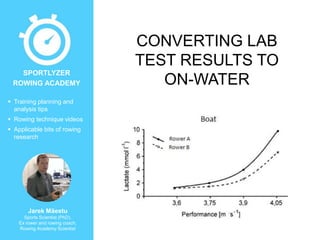Converting lab test results to on-water
- 1. ’é¦ Training planning and analysis tips ’é¦ Rowing technique videos ’é¦ Applicable bits of rowing research Jarek M├żestu Sports Scientist (PhD), Ex rower and rowing coach, Rowing Academy Scientist SPORTLYZER ROWING ACADEMY CONVERTING LAB TEST RESULTS TO ON-WATER
- 2. SPORTLYZER ROWING ACADEMY Why is performance evaluation important? ŌĆó To get feedback whether the adaptation of the athlete is positive and according to what was planned; ŌĆó To determine and control the intensity zones for particular athlete. Feedback from evaluation must allow changes to be made in the plan if necessary. To get the most of the test, the test should be as specific as possible.However, it is not always easy to follow this in rowing, as standardized conditions could be created in lab, but on-water conditions are often affected by wind, currents, waves etc.
- 3. SPORTLYZER ROWING ACADEMY Measurements in lab and on-water Though it has been shown that rowing ergometry and on-water rowing have similar physiological and energetic demands on particular intensities (Figure 1, Hofmann et al. 2007), there may also be some divergences. 0 10 20 30 70 90 110 130 150 170 190 Water Ergometer 0 2 4 6 8 10 12 Target HR Time HR(b.min-1) La(mmol.l -1 ) Figure 1. Rowing at anaerobic threshold and the corresponding lactate concentration on ergometer and on-water rowing
- 4. SPORTLYZER ROWING ACADEMY One of those divergences may rise due to the position in the boat where the athlete is. It has been indicated that lactate performance curves of two rowers could differ completely in the lab and on water (Figure 2, Coen et al. 2003). Figure 2. The influence of the position in the boat to the lactate performance curve in coxless pairs. Rower A ŌĆō stroke side, rower B ŌĆō bow side. As can be seen, rower A who indicates a lactate performance curve that can be considered better compared to rower B on ergometer test, actually has higher lactate values in the boat. This may cause problems in setting the appropriate training intensities and eventually results in much higher training load for rower A in the boat than expected.
- 5. SPORTLYZER ROWING ACADEMY In Conclusion ŌĆó Rowing on the ergometer and on-water can be considered physiologically similar; ŌĆó The position of the rower in the boat can, however, affect the physiological response to the certain intensity. References ŌĆó Coen B, Urhausen A, Kindermann W. Sport specific performance diagnosis in rowing: An incremental graded exercise test in coxless pairs. International Journal of Sports Medicine, 2003; 24: 428-432. ŌĆó Hofmann P, J├╝rim├że T, J├╝rim├że J, Purge P, M├żestu J, Wonisch M, Pokan R, von Duvillard SP. HRTP, prolonged ergometer exercise and single sculling. International Journal of Sports Medicine, 2007; 28: 964-969.
- 6. SPORTLYZER ROWING ACADEMY Hey, before you go! Please Tweet, Like, +1 and share this presentation if you found it helpful or entertaining. Next slide: learn more about the Rowing Academy
- 7. Sportlyzer Rowing Academy Sportlyzer Rowing Academy is No 1 source for rowing coaches looking for inspiration and ideas to: ŌĆó make training plans more effective ŌĆó plan and analyze athletes' progress better ŌĆó learn from other coaches' experience Discover more ŌĆó Distribution of training intensities (slideshow) ŌĆó Performance limitations in elite rowing (video presentation) ŌĆó Olympic single scull technique (video analysis) More related reading







